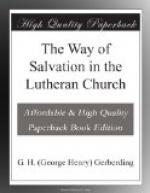But now, we know that this is not a human institution. The Church has received it from the hands of the Son of God. It was ordained by Him who could say, “All power is given unto Me in heaven and in earth,” and, “In whom dwelt all the fullness of the Godhead bodily;” who even before his birth in human form was called “the Mighty God, the everlasting Father, the Prince of Peace.” When we come to deal with an institution of His, we dare never expect to fathom or test it by our poor, short-sighted and sin-blinded reason, philosophy, science, or common sense. “For my thoughts are not your thoughts, neither are your ways my ways, saith the Lord. For as the heavens are higher than the earth, so are my ways higher than your ways, and my thoughts than your thoughts.” Whenever, therefore, we come to deal with anything that comes from His hands, it is no longer of the earth, earthy, and is not subject to earthly laws and human rules. His acts, His deeds, His words, belong to the realm of faith, and not of reason. Reason must ever be taken captive and made to bow before the heavenly things connected, with Him. Or shall we try to reason out His human birth, His growth, His nature, His deeds? Shall we reason out the feeding of the multitudes with those few barley loaves and fishes? No; they came through His hands, and the power of those hands we cannot comprehend. We cannot comprehend how that afflicted woman could receive virtue, health and life, by touching the hem of His garment—a mere fabric of cloth—or how the clay and spittle from His hands could open the eyes of one born blind.
Whenever, therefore, we come to study this ordinance, let us ever bear in mind its divine origin. It is the Lord’s Supper. This precaution will be a safeguard against error, and a help to the truth.
We notice secondly the time of institution. It was “in the night in which He was betrayed.” That awful night, when the clouds of divine wrath were gathered over Him, and were ready to burst upon Him; when the accumulated guilt of a sinful race was all to be laid on Him, borne by Him as though it were His own, and its punishment endured as though He had committed every sin. Then, when the strokes of




